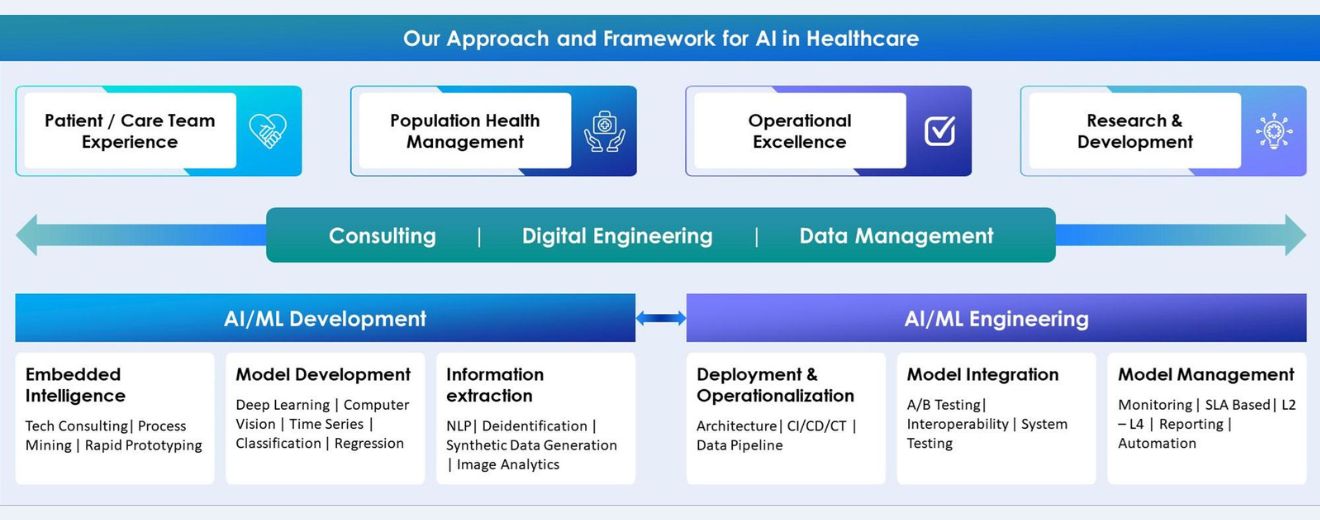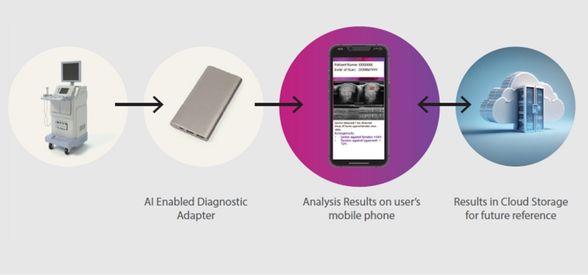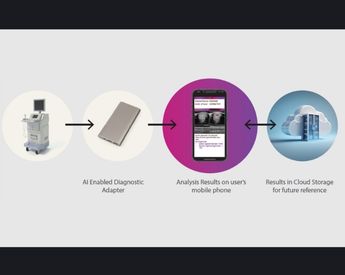

AI for Leaders
An initiative by Tata Elxsi to help healthcare and life sciences industry leaders delve into the AI use cases to maximize efficiency, performance, and outcomes.
Read more

The Transformational Era of AI in Healthcare
Learn how Multimodal and Neuromorphic AI transform healthcare by improving diagnostics and treatments, merging engineering with medical insights for better care.
Read Article

Transforming Healthcare with AI
A Technical Roadmap to Innovation, Compliance, and Metrics
Watch WebinarAI Solutions for Healthcare
Artificial Intelligence (AI) in healthcare is rapidly reshaping how providers diagnose, treat, and engage with patients. From medical imaging and genomics to digital therapeutics and IoMT, these AI solutions offer faster, more precise clinical insights. They reduce errors, streamline workflows, and improve patient outcomes through real-time monitoring and predictive analytics. Innovative platforms like AIVA, TEDAx, and TETHER are transforming data handling, enhancing regulatory compliance, and ensuring secure collaboration across multiple healthcare ecosystems.
Yet, organizations grapple with evolving regulatory compliance standards such as HIPAA and GDPR, all while scaling legacy systems. Forward-thinking, AI-driven approaches safeguard both patient data and enhance healthcare operational integrity.
AI-Powered Diagnostic Solution for Musculoskeletal Injury Assessment


Here’s How We Help
AI-driven diagnostics and imaging
- Enhance diagnostics with ML-based imaging for early disease detection at 90%+ accuracy.
- Automate data analysis to reduce errors, streamline workflows, and cut clinical risk.
Driving personalized and predictive care
- Use data accelerators like TEDAx to securely unify genomic, imaging, and real-time patient records.
- Generate actionable insights that guide risk assessments, refine therapies, and optimize care plans.
Optimizing workflows and engagement
- Automate tasks, reduce errors, and ensure compliance with GDPR and HIPAA.
- Use conversational AI to enhance patient communication, enabling real-time care.
Service Framework for AI Solutions in Healthcare

Our AI healthcare service framework orchestrates data integration, regulatory compliance, and advanced analytics in a unified architecture. It connects end-to-end processes, from medical imaging to patient engagement, with secure, scalable modules for real-time insights, predictive modeling, and high-volume data handling. By centralizing datasets and applying AI-driven models, it eliminates silos.
High-Accuracy Diagnostics
Elevate clinical confidence with advanced AI-driven analytics that continuously learn from diverse datasets, including imaging, genomics, and EHRs. Predict disease onset with near-human accuracy, minimizing false positives and negatives. Comprehensive dashboards enable specialists to interpret real-time results, improving outcomes, reducing diagnostic delays and resource constraints. Such precision transforms clinical workflows.
Scalable Compliance and Security
Protect sensitive health data with HIPAA-ready, GDPR-compliant frameworks that automate policy enforcement across heterogeneous systems. Our architecture integrates robust encryption, role-based access, and continuous auditing to meet strict, global regulatory norms. This scalable foundation expands as patient volumes grow, ensuring uncompromised performance, reliable patient trust, and reduced risk of breaches.
End-to-End Patient Engagement
Leverage generative AI and conversational AI to deliver seamlessly personalized interactions throughout the care lifecycle. Engage patients via secure, meaningful messaging, interactive triage, and virtual coaching, reducing wait times and clinical overhead. Two-way data integration ensures providers track adherence, flag risks, and proactively intervene, enhancing satisfaction and continuity of care.
Why Tata Elxsi?
- An AI Center of Excellence blending technical innovation with regulatory expertise for secure, compliant solutions.
- Over 1,000 person-years of AI development experience, backed by 300+ experts skilled in advanced frameworks.
- Product oriented delivery (POD)-based engagement model ensuring deep cross-functional teams align healthcare strategies for maximum efficiency and customization.
- Proprietary AI accelerators like AIVA, TEDAx, and TETHER boost deployment speeds, security, and compliance coverage.
- Strong focus on continuous R&D, ensuring solutions stay future-ready, adaptable, and optimized for emerging technologies.
Information Hub
-
How do AI solutions help reduce clinical errors in healthcare?
A robust AI-driven system can analyze massive datasets, cross-reference medical histories, and apply advanced algorithms for early detection of abnormalities. By automating routine tasks and providing clinical decision support, AI reduces the risk of human oversight. When integrated with real-time monitoring tools, AI solutions help identify potential issues faster, improving outcomes.
-
Is AI-driven patient care compliant with strict regulations like HIPAA and GDPR?
Yes. Modern AI healthcare platforms incorporate security features such as encryption, role-based access, and automated audit trails. These safeguards meet global data privacy regulations like HIPAA and GDPR. Additionally, compliance frameworks are continuously updated to accommodate changes in policy. By embedding these controls into the architecture, AI-driven solutions ensure patient data remains protected and fully compliant.
-
Can AI integrate with our existing healthcare systems without major disruptions?
Absolutely. AI solutions are typically designed to interface with existing EMR, EHR, and legacy systems through APIs or middleware layers. These integrations enable seamless data exchange, reducing the need for large-scale infrastructure overhauls. By adopting a modular deployment approach and robust data mapping strategies, organizations can gradually implement AI capabilities without significant operational disruptions or downtime.
-
What kind of ROI can healthcare providers expect from AI-driven solutions?
AI offers returns through faster diagnoses, reduced errors, and streamlined workflows, ultimately lowering operational costs. Predictive analytics can help prevent complications and readmissions, improving patient satisfaction while reducing financial burdens. Real-time data insights empower proactive interventions, saving time and resources. Over time, these benefits compound, delivering a substantial ROI that justifies initial AI implementation costs.
-
How quickly can an organization adopt AI healthcare solutions and see results?
Timelines vary by project scope, data readiness, and regulatory factors. Some healthcare providers see improvements in workflow efficiency within a few weeks of pilot deployments. Comprehensive projects—like AI-driven imaging analytics—may require several months for validation, training, and scaling. With agile methodologies and specialized support from Tata Elxsi, organizations can expedite AI adoption and witness measurable impacts sooner.
-
How is artificial intelligence transforming healthcare?
AI solutions in healthcare are driving breakthroughs in predictive diagnostics, clinical decision support, personalized treatment, and administrative efficiency. By automating routine tasks and analyzing vast healthcare datasets, AI helps clinicians make more informed decisions and improves patient safety. Responsible AI implementation, supported by transparent models and explainability, is key to gaining trust and regulatory acceptance in the healthcare industry.











